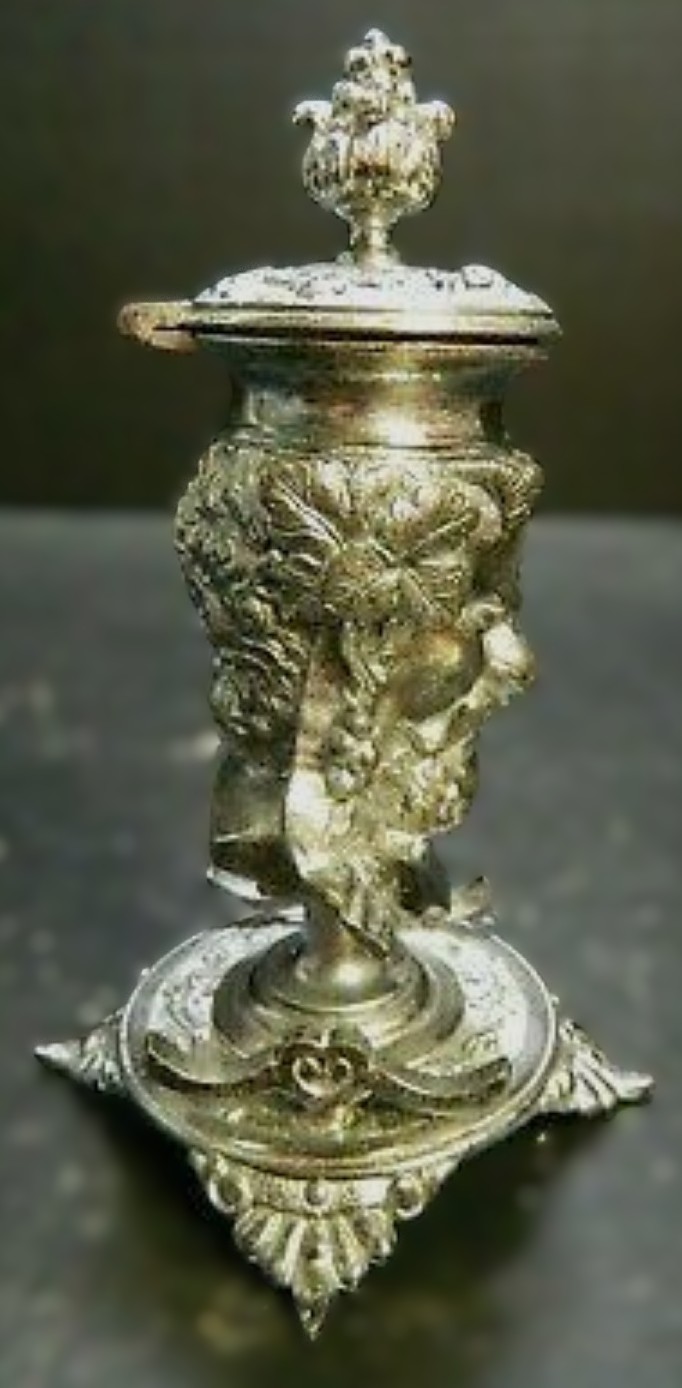
Inkstand Featuring Bacchus
| Categories | Figural - Mythology; Literature; Religion; Fictional |
| Type | Mythology |
| Material | Silverplate |
| Markings | See Narrative |
| Manufacturer | Meriden Silver Co. |
| Origin | United States |
| Date or Era | circa 1886 |
| Measuring | 3 ½” x 3 ½” x 5 ¾” high |
This inkstand features the face of Bacchus, manufactured by the Meriden Britannia Company and dating to approximately 1886, as evidenced by a drawing from a company catalogue of that year. The piece is made of a base metal and is marked “Quadruple Plate”.
Description of the Inkstand
The central feature is a three-dimensional bust of Bacchus, with a wild, ecstatic expression, a full beard, and horns. The inkwell itself is set inside the head, concealed by a separate, hinged lid. The lid is a domed, decorated cap with a finial shaped like a cluster of grapes, which is a classic symbol of the god of wine. The inkstand’s base has two integrated pen holders, and stands on ornate feet.
About the Manufacturer and Finish
The Meriden Britannia Company, founded in 1852 in Meriden, Connecticut, was a major American manufacturer of electroplated silver wares. The “Quadruple Plate” mark on this inkstand signifies a high-quality, durable silver finish. This process involved a heavier layer of plating (four times the standard thickness), making it more resilient to wear and tarnish. Meriden Britannia Company became a key part of the larger International Silver Company in 1898.
Bacchus vs. the Devil
The figure on this inkstand is a depiction of Bacchus, not the devil, based on its specific iconography. A devil in Western art is typically portrayed with a menacing expression, whereas this figure has a more joyous and boisterous look. The horns on Bacchus (also known as the Greek god Dionysus) are a symbol of his wild, primal nature and connection to his followers, the satyrs. Most importantly, the presence of grapes and vines, which are visible in his beard and on the lid’s finial, are the primary and most recognizable attributes of the god of wine. The devil’s horns, by contrast, were later borrowed from pagan deities like Bacchus by early Christian artists to signify evil.
Estimated value: $150
Content disclaimer. The information posted is the owner’s best knowledge and may not have been vetted by the SOIC. We welcome comments, corrections, and additions, working to make our website information comprehensive and accurate.
Join the Society of Inkwell Collectors (SOIC) – it’s free!
Founded in 1981 as a non-profit organization,
we are documenting inkwells (and accessories).
We’re here to help and inform!














